|
|
Cattle
Dog
(Red
Heeler)
(Female)
Born
Aug 22
2012 |
|
|
|
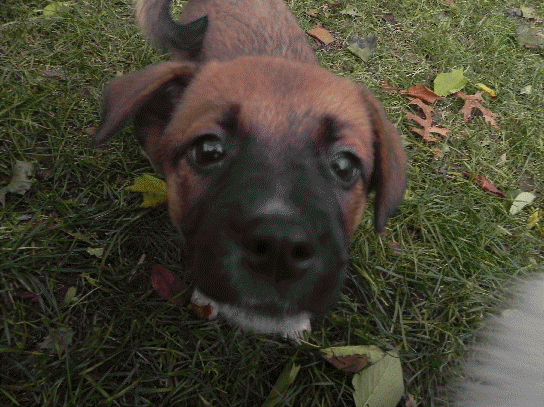
SANDY |
|
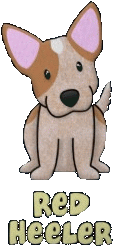 |
|
Obedient
and Devoted
The
Australian Cattle Dog is also known as the Blue or Red Heeler. They
are a tough, hard working dog who can cover immense distances. They
are a versatile herding dog and can work with horses, goats and even
ducks. Considered a working dog who is fearless and determined.
Very
Playful
A
one-person dog, they are rather aloof with strangers, but to their
owner they are eternally loyal, gentle, alert and can easily be
trained. They are quite easygoing with people they know, and can get
along with children, although they may try to herd them.
Sociable
and
Active
Australian
Cattle Dogs are bold and determined. This is an extremely hard
working breed. They have constant energy and need to be doing things.
The Australian Cattle Dog is loyal and friendly to those it knows,
but wary with strangers. They are protective and easygoing.
Yet
another goofy girl
Always
moving, always playing, then she just drops and falls asleep.
Not
so Primitive Origins
Developed
in Australia around the early 1800s, the Australian Cattle Dog was
used to cross great distances in herding cattle. Since records were
not well kept it is only with speculation that their ancestry is known.
The
breed was "perfected" in 1893, but it wasn't until 1903
that they were known as the the Australian Cattle Dog.
Just
a dog?
This
puppy fit in with our other dogs in about a day, she has no idea how
spoiled she will be.
As
of November 2016, she is now the head of the house. |
|
Black
Lab
(Female)
Born
June 4
2014 |
|
|
|
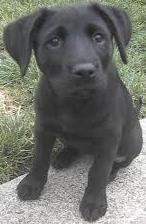
COCO |
|
 |
|
Description
of her mix
Our
Lab is a cross bred between Boxer and Labrador Retriever. They are
thin, but tall dog. They have shiny short and smooth coat that is
waterproof. They ears are hanging. Strong jaw in scissors bite, They
too are a very masculine type of dog.
Obedient
and Devoted
CoCo
is extremely intelligent and adapts well to her surroundings with
minimal training time. She is a great companion dog, we do not use
her to hunt, only as a family companion.
Active
but Calm
She
is not what I would consider a "hyper" dog, but she is
active. She loves to run and romp in our backyard with our Australian
Cattle dog "Sandy" and she greatly enjoys being outside.
After she has been exercised for the day, she is content to lay by
our feet or on top of the other dogs and relax at the end of the day.
Not the water rat we thought she would be so far.
Seen
here with Sandy & Ozzy
She
really enjoys being next to her human family. If we get up to go to
a different room, she accompanies us.
Country
Of Origin
Germany
Temperament
This
breed is loving, loyal to their owner and very affectionate. They
could also be a perfect pet dog. They also love to play around and
could socialize with the people around them and even with other dogs.
They could also be a guard dog and would bark to alarm when
suspicious stranger would invade their home.
CoCo
was a rescue from
Friends
of Freddie Pet Rescue |
|
|
(COWBOY) Corgi
(Female)
Born
Sept.
22 2021 |
|
|
|
Our
Stella |
|
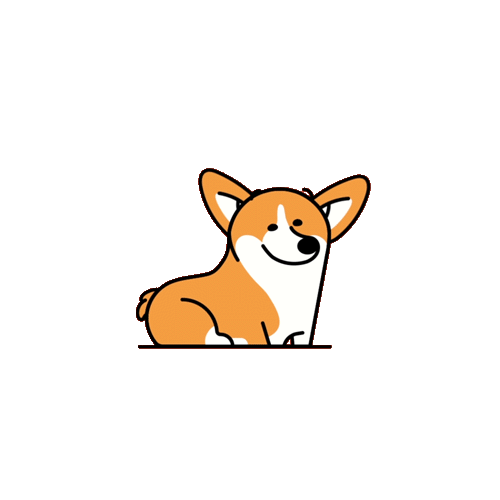 |
|
Description
of her mix
Our
Corgi Stella is among the most agreeable of all small housedogs, the
Welsh Corgi is a strong, athletic, and lively little herder who is
affectionate and companionable without being needy. They are one the
world's most popular herding breeds. At 10 to 12 inches at the
shoulder and 27 to 30 pounds, a well-built Welsh Corgi's presents a
big dog in a small package. Short but powerful legs, muscular thighs,
and a deep chest equip him for a hard day's work. Built long and low.
Very
Playful
Welsh
Corgi's are surprisingly quick and agile. They can be red, sable,
fawn, and black and tan, with or without white
markings. This Corgi is a bright, sensitive dog who enjoys
play with his human family and responds well to training.
Obedient
and Devoted
As
herders bred to move cattle, they are fearless and independent. They
are vigilant watchdogs, with acute senses and a Big
dog bark. Families who can meet
their bold but kindly Welsh Corgi's need for activity and
togetherness will never have a more loyal, loving dog.
|
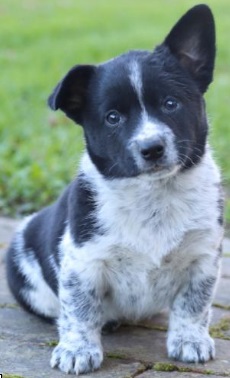
STELLA
AT HER NEW HOME |
Country
Of Origin
Europe
Stella
is a Cowboy (Black and White in color) Corgi mix with
a little Cattle Dog which gives her the spots on her legs and feet.
|
STELLA
AT HER NEW HOME |
Lets
see how she reacts with Sandy.....
Jess
has been waiting years for this puppy and thanks to her grandfather
and family, She was Picked up in Pennsylvania on 12/13/21 to join our household. |
|
|
American
Eskimo
(Male)
Born
May
2001 to Nov 26 2016
(Complications
associated with
Liver
/ Kidney Cancer)
Our Special
Boy - Very missed |
|
|
|
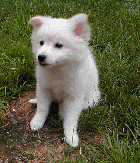
OZZY |
|
 |
|
Obedient
and Devoted
The
American Eskimo is a charming, affectionate and loving dog. Hardy
and playful, they are excellent with children. Highly intelligent and
willing to please. Alert and easy to train, the American Eskimo often
ranks among the top scorers in obedience trials. Some individuals
have a willful streak, but most like to work. They are naturally wary
of strangers, but once introduced, they become instant friends. Some
have been known to not let a stranger enter the home until the owner
says it is okay. Eskimos need to be part of the family and engage in
nuisance activities when isolated. This breed needs attention and
loves to bark.
Playful
but easily
bored
American
Eskimo Dogs are among the most intelligent of the dog breeds. They
have problem solving capabilities, are very independent thinkers, and
are easily bored. Eskies are generally very cheerful, hardy, rowdy,
playful, nosey, affectionate, and don't recognize the fact that they
are small dogs. They crave attention and must be made members of the
family or they can become problematic. They are mischievous
tricksters, and many owners describe them as having a sense of humor.
Most Eskies are very friendly and outgoing with family members and
people they know, but tend to be reserved and suspicious around
strangers. Eskies are also very vocal; many owners claim that their
Eskies try to "talk" to them. The breed is a very good and
devoted watchdog, and is commonly used as such, but it can become a
problem barker if left alone for too long. Eskies take their watchdog
duties very seriously.
Sociable
and
Active
Most
of them are also avid chewers and need a constant supply of chew
toys. Most Eskies are excellent with children, other dogs, and cats
as long as the Eskie is exposed to them at a young age. Eskies are
somewhat predatory, though, so they need to be watched closely around
rodents, birds, and other small pets. Eskies tend to be energetic,
and young dogs should be kept busy or they can become mischievous and
destructive. Older Eskies are usually more sedate and become more
affectionate with age, preferring to be petted or cuddled over
running around. Many American Eskimo Dog owners keep more than one
dog so they can keep each other entertained, though lone Eskies do
very well in busy households.
Acts
like a typical boy
Eskies
do shed a lot, and they require frequent brushing to prevent matting
(especially behind the ears) and to cut down on the shedding. The
Eskie is amazingly easy to keep clean despite being a white dog.
Eskie fur contains an oil that prevents dirt from adhering to it.
When an Eskie gets dirty, usually the dirt brushes right out of the
fur as long as the fur is dry. Unless they are very dirty, Eskies
rarely have a dog smell. Eskies love cold climates, though they do
well in just about any climate. One of the joys of American Eskimo
Dog ownership is watching an Eskie play in the snow. Most Eskies LOVE
snow and will play in it for hours if allowed. Many of them also like
to play in water.
Primitive
Origins
The
American Eskimo Dog nicknamed Eskie, belongs to the Spitz group, one
of the most ancient of dog breeds. In 500BC depicted on Greek vases
were drawings of the Spitz. In Eurasian times (800-100BC)
documentation was found on the Spitz breed. They are descendants of
the White German Spitz dogs. This breed lived in the late stone age.
Just
a dog?
Not
just another dog, but a big white fluffy bundle of fun. Our dog Ozzy
followed Roxy's lead knowing she was older and the boss of the pack,
now it's his turn to be the top dog. He knows how to take advantage
of his surroundings.
Laurene
and Ron's first pet together.
Ozzy
knew all of our dogs.
Our
boy was always happy ! |
|
Shiba
Inu
(Female)
Nov
1994 to Feb 2009
(Old
Age)
She
is missed |
|
|
|
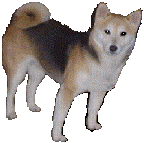
ROXY |
|
 |
|
Fearful
but Courageous
Young
Shiba Inus are fearful of many things. Trains, planes, traffic,
shopping malls, etc. The pups are highly uncivilized and need a lot
of exposure to things before they will feel comfortable. But beware!
Once they feel comfortable, they can become arrogant. They have big
egos. It takes a while to gain the trust of a Shiba Inu, but once
bonded, they become very attached. If not socialized a lot, they can
become protective as well, eagerly confronting perceived threats to
their leader. In this respect they show no fear. The size or ferocity
of the "enemy" doesn't matter to them at all.
Disobedient
but Devoted
Shiba
Inus resist captivity and any form of restraint, such as wearing a
collar. It takes a lot of work and patience to get them to walk
properly on a leash. And if they ever slip the leash, they may
disappear. But most return by themselves (after they have had their
fun). They have an amazing sense of direction. Trouble is, they don't
look both ways before crossing streets and so could get killed in
traffic. If you command them to "Come", they stare at you
inquisitively, as if to ask "What for?" If you answer
"treats" or "play" or "walk", they'll
probably come running. If you don't answer, they probably won't come.
Though fiercely independent, they are nonetheless faithful to their
leader. They are sort of one family dogs. They don't become
destructive when separated from the family, but they get very, very
sad. Most people wouldn't have the heart to board their Shiba Inu
when they go away on vacation. It's better to find another family
member to look after the dog.
Active
but Calm
Shibas
love activity and would like nothing better than to play 24 hours a
day. They are notorious attention seekers. But they also like chewing
a bone and taking naps, especially if they can snuggle up close to
someone they like. But they wake up quickly if there is any activity
going on in the house. Start doing a household chore and they appear
out of nowhere. Open the fridge door and they're there. They appear
everywhere---like little fairy sprites.
Seen
here with OZZY
Sociable
but Aloof
A
Shiba Inu could never be happy living in a doghouse. They want to be
with the family at all times. They are very inquisitive, interactive, in-your-face
dogs. At the same time, they may not give a warm reception to every
guest that comes into your home. When some people come over, they
won't even go into the same room. On the other hand, they may adore
other guests, especially if the guests are willing to play with them,
and play the games that they like.
Extra
Sensory Perception
A
Shiba Inu can read emotions remarkably well. You can't fool a Shiba
Inu with a phony smile. If you are harboring any resentment, they
will know it. If you intend to trim their nails, they will know that,
too. Even if you just think about trimming nails, they will know.
Primitive
Origins
Images
of deer, wild boar, and other prey are buried deep within the
recesses of a Shiba Inu's mind. There are more Shibas in Japan than
any other breed. Around 7000 BC the ancestors of today's Shiba may
have accompanied the earliest immigrants to Japan. These primitive
tendencies become apparent at Christmas time. A Shiba Inu may attack
any lawn ornament that depicts reindeer or antlers.
Just
a dog?
A
Shiba Inu is not just a dog. It is a unique animal. The Japanese
people recognized the special qualities of the breed and declared it
a National Treasure. Great contentment comes with owning a Shiba Inu.
Our
dog Roxy was the alpha dog of the household and she expects to be
pampered and respected as such. She is greatly missed. |
|
Pug
(Female)
Aug
2009 to
Oct
2013
(Complications
associated with
Herniated
Disc operation)
She
is missed |
|
|
|
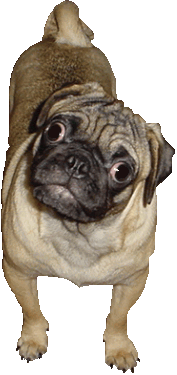
TWINKY |
|
 |
|
Obedient
(at
times) and Devoted
The
stern expression of the Pug belies its true sense of fun. Pugs are
sociable dogs, and usually stubborn about certain things, but they
are playful, charming, clever and are known to succeed in dog
obedience skills.
Playful
A
Pug's character is unique in that he is a clown at heart with a
terrific sense of humor but at the same time he carries himself with
great dignity. They are not too delicate for fun and games. A pug is
anxious to please, anxious to learn and anxious to love. His biggest
requirement is that you love him back.
Sociable
and
Active
Pugs
are often referred to as the comedians of the dog world. Pugs are
sensitive to the tone of a human voice, so harsh punishment is
generally unnecessary. While Pugs usually get along well with other
dogs and pets, they generally prefer the company of humans and
require a great deal of human attention; they may become slightly
anxious or agitated if their owner ignores them or does not play with them.
Acts
like a goofy girl
Always
at their owner's feet, in their lap, or following them from room to room.
Primitive
Origins
The
Pug is of Chinese origin and dates back to the pre-Christian era.
They were prized possessions of the Emperors of China and lived in a
most luxurious atmosphere and at times were even guarded by soldiers.
Records show that three types of short nosed dogs were bred by the
Chinese. They were the Lion dog, the Pekingese and the Lo-sze. The
Lo-sze or "Foo Dog" was the ancient Pug. The Dutch traders
brought the Pugs from the east to Holland and to England. The more
refined Pug that we know today must be credited to the English. This
happy little dog was enjoyed by many Monarchs of Europe and to this
day is a favorite with royalty and discerning people all over the world.
Just
a dog?
The
Pug is enjoying a rather steady rate of growth in popularity at the
present time. Twinky is not so popular as to be common nor so unknown
as to be rare, but she was all ours.
Too
Soon - She is greatly missed. |